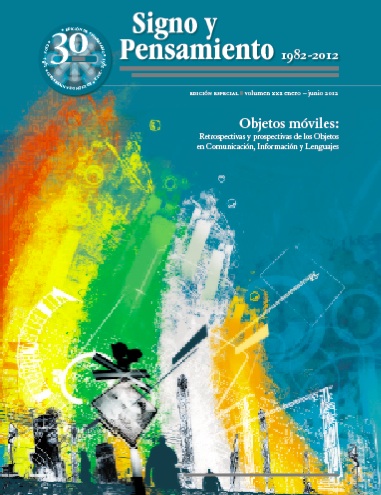Resumen
Los materiales de lengua y en particular los libros de texto son para los aprendices una fuente de exposición a la lengua y a la cultura. En los contextos multiculturales, estos se convierten en potentes herramientas que posibilitan los encuentros interculturales entre los individuos que poseen diferentes formaciones culturales. Sin embargo, la realidad muestra que en gran parte los libros de texto siguen siendo diseñados desde perspectivas tradicionales que no permiten a los aprendices desarrollar habilidades comunicativas para sortear encuentros interculturales. Por el contrario, refuerzan estereotipos y apoyan la idea de que una nacionalidad es superior a otras. Este artículo presenta algunos constructos teóricos y los resultados tomados de una etapa de una investigación cualitativa que buscó determinar cómo un conjunto de materiales basados en principios podían desarrollar la competencia comunicativa intercultural en estudiantes de lenguas (CCI).
— (2008), “On becoming a global soul: A path to engagement during study abroad”, in V. Savicki, Developing intercultural competence and transformation. Theory, research, and application in international education, (pp. 13-31), Sterling Virginia USA, Stylus Publishing, LLC.
— (1998), Basic concepts of intercultural communication. Selected readings. Boston USA, Intercultural Press, A Nicholas Brealey Publishing Company.
Buttjes, D., & Byram, M. (1991), Mediating languages and cultures, Clevedon, Avon, Multilingual Matters.
Byram, M. (1989), Cultural studies in foreign language education, (D. Sharp, Ed.), Clevedon UK, Multilingual Matters Ltd.
— (1997), Teaching and assessing intercultural communicative competence, Clevedon, United Kingdom, Multilingual Matters.
Byram, M., & Fleming, M. (1998), Language learning in intercultural perspective. Approaches through drama and ethnography, Cambridge, Cambridge University Press.
Byram, M., Nichols, A., & Stevens, D. (2001), Developing intercultural competence in practice, Clevedon UK, Multilingual Matters LTD.
Corbett, J. (2003), An intercultural approach to English language teaching, Clevedon, Great Britain, Multilingual Matters.
Council of Europe. (June 2008), The White Paper on Intercultural Dialogue: living together as equals in dignity, Strasbourg, Council of Europe.
Cummins, J., Harley, B., Swain, M., & Allen, P. (1990), “The nature of language proficiency”, in J. Cummins, B. Harley, P. Allen, & M. Swain, The development of second language proficiency, (pp. 7-24). Cambridge UK, Cambridge University Press.
Davcheva, L., & Sercu, L. (2005), “Culture in teaching language materials”, in L. Sercu, E. Bandura, P. Castro, L. Davcheva, C. Laskaridou, U. Lundgren, et al., M. Byram, & A. Phipps (Eds.), Foreign language teachers and intercultural competence, (pp. 90-109), Clevedon UK, Multilingua Matters LTD.
Deardorff, D. K. (2008), “Intercultural competence: A definition, model, and implications for education abroad”, in V. Savicki, Developing intercultural competence and transformation: Theory, research, and application in international education, (pp. 32-53), Sterling Virginia USA, Stylus Publishing, LLC.
Fantini, A. E. (2000), A central concern: developing intercultural competence. Adapted in part from a `Report by The Intercultural Communicative Task Force, Brattleboro Vermont USA, World Learning.
— (2006), “SIT Graduate Institute. A program of world learning”, pdf. Retrieved 2008, June-5 from: http://www.sit.edu/publications/docs/feil_research_report.pdf
Fennes, H., & Hapgood, K. (1997), Intercultural learning in the classroom. Crossing borders, London UK, Cassell Council of Europe Series.
Geertz, C. (1975), The interpretation of cultures, New York, Basic Books.
Kolb, D. (1984), Experiential learning: experience as the source of learning and development, New Jersey US, Prentice Hall.
Kramsch, C. (1998), Language and culture, Oxford, Oxford University Press.
Lázár, I., Huber-Kriegler, M., Lussier, D., Matei, G., & Peck, C. (2007), Developing and assessing intercultural communicative competence, Austria, Council of Europe Publishing.
Moon A., J. (2004), A handbook of reflective andexperiential learning: theory and practice, Abingdon, Oxon UK, Rootledge Falmer.
Pulverness, A. (2003), “Materials for cultural awareness”, in B. Tomlinson, Developing materials for language teaching (pp. 426-438), London, Great Britain, Continuum.
Quappe, S., & Cantatore, G. (2007), “What is cultural awareness, anyway? How do I build it?” Retrieved 2009, October-22 from Culturosity.com: http://www.culturosity.com/articles/whatisculturalawareness.htm
Rico Troncoso, C. (2010), “The effects of language materials on the development of intercultural competence”, in B. Tomlinson, & H. Masuhara, Research for materials development in language learning (pp. 83-102), London, Continuum.
Savicki, V. (2008), Developing intercultural competence and transformation. Theory, research and application in international education, Virginia, United States of America, Stylus Publishing.
Sercu, L., Bandura, E., Castro, P., Davcheva, L., Laskaridou, C., Lundgren, U., et al. (2005), Foreign language teachers and intercultural competence: an international investigation, Clevedon UK, Multilingual Matters.
Tomlinson, B. (2003), “Developing principled frameworks for materials development”, in B. Tomlinson, Developing materials for language teaching, (pp. 107- 129), London UK, Continuum.
Valdes, J. (1986), Culture bound: bridging the cultural gap in language teaching, Cambridge, UK, Cambridge University Press.
Esta revista científica se encuentra registrada bajo la licencia Creative Commons Reconocimiento 4.0 Internacional. Por lo tanto, esta obra se puede reproducir, distribuir y comunicar públicamente en formato digital, siempre que se reconozca el nombre de los autores y a la Pontificia Universidad Javeriana. Se permite citar, adaptar, transformar, autoarchivar, republicar y crear a partir del material, para cualquier finalidad (incluso comercial), siempre que se reconozca adecuadamente la autoría, se proporcione un enlace a la obra original y se indique si se han realizado cambios. La Pontificia Universidad Javeriana no retiene los derechos sobre las obras publicadas y los contenidos son responsabilidad exclusiva de los autores, quienes conservan sus derechos morales, intelectuales, de privacidad y publicidad.
El aval sobre la intervención de la obra (revisión, corrección de estilo, traducción, diagramación) y su posterior divulgación se otorga mediante una licencia de uso y no a través de una cesión de derechos, lo que representa que la revista y la Pontificia Universidad Javeriana se eximen de cualquier responsabilidad que se pueda derivar de una mala práctica ética por parte de los autores. En consecuencia de la protección brindada por la licencia de uso, la revista no se encuentra en la obligación de publicar retractaciones o modificar la información ya publicada, a no ser que la errata surja del proceso de gestión editorial. La publicación de contenidos en esta revista no representa regalías para los contribuyentes.


